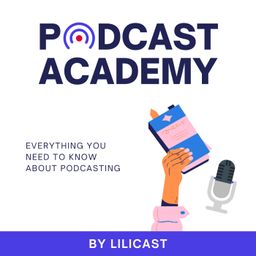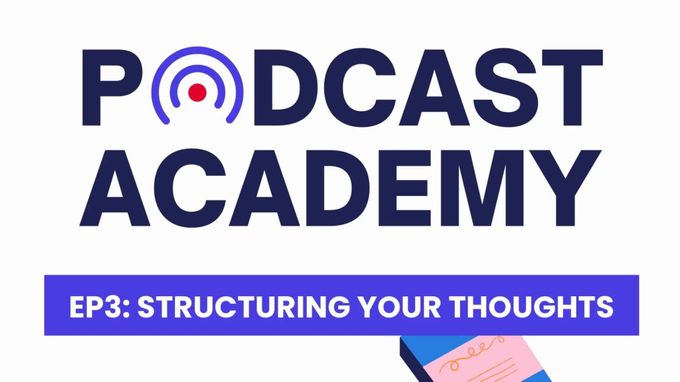
3 - STRUCTURING YOUR THOUGHTS

Chapters































Description
(00:00:00) INTRO: THE 5 WS PRINCIPLE In this new episode of the Podcast Academy, we are going to teach you how to structure your thoughts. It is a vast topic, isn't it? To convey your message, I would like to advise you to visit the basics of journalism, which means the 5Ws principle by answering the questions starting with the following interrogative words: Who, what, where, when, and why. In French, this principle has been extended by two extra interrogative words. Journalism students are normally aware that they have to answer the 7 following questions in their articles: Who, what, when, where, how much, how and why? However, since your podcast is not a news article, you do not need to strictly stick to those questions. This principle has been inspired by Aristotle, and it can be a good source of inspiration when you lack some creativity or do not know what to start with. This method helps to classify your information in such a way that you will not skip anything important or forget to mention. The information can be quite brief at first. Try to explain why you have decided to approach those topics and how you are going to find a solution to an existing problem. You have to touch the subject in such a way that captivates the interest of your audience, but without divulging too much as this will be developed along the way. We shall also talk about the creation of suspense later on. (00:01:29) HOW TO WRITE YOUR INTRO A podcast is divided into several parts. Let's start from the beginning: First of all, there is the introduction. It is always pleasant to add some music to the introduction. This is not obligatory but it helps your audience to dive smoothly into your universe. Your first words have to be carefully chosen: Introduce yourself briefly and your podcast. Do not forget that not all your audience know you or follow all of your podcasts. Even though you are presenting your fifth episode, it could be your audience's first episode. So try to put things into their context, always mention the theme of your podcast and also the topic of your episode so that your audience has an idea of what they are listening to. Keep it short and simple. Think of subject-verb-complement. You will see: Trying to keep things brief can be harder than when you have to explain a lot of things. Writing your text helps to work on what you are going to communicate. However, there is one thing you should never lose sight of when you are writing: The text you write will eventually be read aloud. So, unless you are doing a poetic podcast, construct impactful sentences and use simple words. To introduce your topic, do not hesitate to share a funny story or current news that has had an influence on you. Also do not forget to include your personality as well: Your audience wants to hear the 'real you'. Your tone, humour and temperament will make your podcast unique and stand out from others. Always include your personality traits. This is how you will stand from the crowd in the podcast world. (00:03:10) jingle (00:03:12) DEVELOP YOUR TOPIC Make space for the 'main course' once your idea has been introduced! You now master the topic you are going to talk about but how are you going to develop your topic? If you think logically, you probably have to come up with a plan, ideas that are clearly spread out and with carefully chosen keywords. Words will fall into place after having structured your table of contents. People of a literary nature will probably write their text however they feel like, in a more random manner, and will do the structure afterwards. There is no right or wrong way. We all have our ways, you have yours, and this is what matters. Another important question: Should you make your audience wait, increase the tension, and introduce some suspense? This is tempting but it is not always a good idea. Everything depends on the topic in question, and of course your oratory skills. Everyone has something to say and is able to express themselves easily. But not everyone can make an audience feel impatient, and deliver more intelligently, so as to meet the high expectations of the audience. However, this should be approached carefully so as not to sound too sluggish. If you want to know whether you should do so, ask yourself the type of audience you are addressing and try listening to podcasts that are related to your theme. Does the suspense make sense here? Will this excite your audience, or is your audience only interested in clear, well-detailed information? (00:04:47) HOW TO PREPARE FOR YOUR OUTRO Just like you have carefully worked on your presentation, the same should be applied to your outro. The conclusion of your podcast is important: The last words you say are the ones that your listeners will mostly remember. Thank them for having paid attention to your podcast until the end, guide them to the description of your podcast where they can find the right links and references for a better understanding of your topic. Invite your listeners to subscribe to your podcast and to follow you on social media so they can be notified of new episodes. And of course, if your topic is ready, summarise your ideas with the main points that seem important to you. Provide your audience with the information that they need to retain. This will refresh their memory and will allow them to summarise the episode to other people and who are keen to hear what you are saying. You see, the impact of word of mouth: Hey, I have listened to this nice podcast and the person was saying that... ' Make life easier and more simple for your listeners by explaining things briefly. Finally, if you already know the topic of your next podcast, you can also include it when closing your episode. This creates more excitement and also shows that you are dynamic and that you produce podcast on a regular basis. (00:06:08) CONCLUSION In conclusion, structure your thoughts before you start talking, that will help you to see clearly and to know how to proceed; this way, you will not lose your audience along the way. Lilicast makes your job easier thanks to its sequence and card features. You can split the content into different parts and move the text up and down. Everything can still be altered easily, so you can always adapt the structure to your episode, even during a recording session, where you realise that whatever you are reading aloud does not make any sense. It is a very practical tool and very user friendly. Do not hesitate to contact us for a quick demo!




